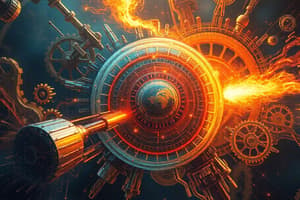Podcast
Questions and Answers
What does thermodynamics study?
What does thermodynamics study?
Heat transfers, energy conversions, and system changes
Define entropy in the context of thermodynamics.
Define entropy in the context of thermodynamics.
Entropy is the degree of disorder in a system.
What does the First Law of Thermodynamics state?
What does the First Law of Thermodynamics state?
Conservation of energy
What does mechanics study?
What does mechanics study?
Give an example of the intersection between thermodynamics and mechanics in real-world applications.
Give an example of the intersection between thermodynamics and mechanics in real-world applications.
How does Newtonian mechanics differ from relativistic mechanics?
How does Newtonian mechanics differ from relativistic mechanics?
Flashcards are hidden until you start studying
Study Notes
Exploring Thermodynamics and Mechanics in Physics
Diving into the depths of physics reveals a complex interplay of forces, energies, and interactions. Two pivotal branches—thermodynamics and mechanics—provide insights into our natural world. Here, we delve into these disciplines to uncover how they shape modern scientific understanding.
Thermodynamics: Energy Flows and Entropy
This branch of physics studies heat transfers, energy conversions, and system changes. Key concepts include temperature, entropy (degree of disorder), and the First Law stating conservation of energy (as discussed in). Understanding thermodynamic processes helps us grasp everything from boiling water to engine efficiency.
Mechanics: Forces Act Upon Objects
Mechanics encompasses the motion and interactions among objects and systems due to forces. Newtonian mechanics deals mainly with classical kinematics and dynamics, while relativistic mechanics explores the effects of mass and velocity near light speed (see). Knowledge of mechanical principles is vital for comprehending everyday devices, spacecraft trajectories, and more.
Intersections of Concepts and Real-World Impact
These two pillars of physics often overlap, creating synergies that enhance our comprehension. For instance, thermodynamic cycles power steam engines and refrigerators, whereas mechanics enables engineers to design vehicles and buildings. Pioneering research by Ahmad Nemer showcased the union of both fields when he studied Synchrotron radiation collisional experiments in Japan (referenced in) to advance knowledge in condensed matter physics.
Moreover, disciplinary boundaries blur in contemporary research, fostering cohesive academic communities (reflected in) amenable to cross-pollinating discoveries. Beyond academia, cutting-edge research fuels innovative technological developments, contributing immensely to improving global living standards.
In conclusion, grasping thermodynamics and mechanics lays the groundwork for profound intellectual exploration. As the study of physical principles continues to evolve, these fundamental domains remain indispensible building blocks of our collective understanding of the physical realm.
Studying That Suits You
Use AI to generate personalized quizzes and flashcards to suit your learning preferences.




